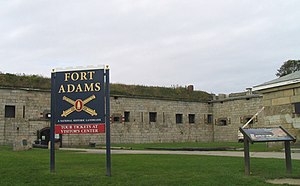Fort Adams
| Fort Adams | |
|---|---|
| Newport, Rhode Island | |
 |
|
| Type | Coastal Artillery Post |
| Site information | |
| Controlled by | United States |
| Site history | |
| Built | 1798–1799; 1824–1857 |
| In use | 1799–1824; 1841–1953 |
| Materials | granite, shale and brick |
| Garrison information | |
| Past commanders |
Captain John Henry Lieutenant Colonel Benjamin Kendrick Pierce Brigadier General Robert Anderson Colonel Henry Jackson Hunt |
|
Fort Adams
|
|
| Nearest city | Newport, Rhode Island |
| Coordinates | 41°28′30″N 71°20′28″W / 41.47500°N 71.34111°WCoordinates: 41°28′30″N 71°20′28″W / 41.47500°N 71.34111°W |
| Built | 1799, rebuilt 1824 |
| Architect | Louis de Tousard (1799), Simon Bernard and Joseph G. Totten (1824) |
| NRHP Reference # | 70000014 |
| Significant dates | |
| Added to NRHP | July 28, 1970 |
| Designated NHLD | December 8, 1976 |
Fort Adams is a former United States Army post in Newport, Rhode Island, established on July 4, 1799 as a First System coastal fortification, and named for President John Adams, who was in office at the time. Its first commander was Captain John Henry, who was later instrumental in starting the War of 1812. The current Fort Adams was built 1824–1857 under the Third System of coastal forts. Today, the fort is part of Fort Adams State Park.
The first Fort Adams was designed by Major Louis de Tousard of the Army Corps of Engineers. After some additions in 1809, this fort mounted 17 cannon and was garrisoned during the War of 1812 by Wood's State Corps of Rhode Island militiamen. The Secretary of War's report for December 1811 describes the fort as "an irregular star fort of masonry, with an irregular indented work of masonry adjoining it, mounting seventeen heavy guns. ... The barracks are of wood and bricks, for one company".
After the War of 1812, there was a thorough review of the nation's fortification needs and it was decided to replace the older Fort Adams with a newer and much larger fort. The new fort was designed by Brigadier General Simon Bernard, a Frenchman who had served as a military engineer under Napoleon. Bernard designed the new Fort Adams in the classic style and it became the most complex fortification in the Western Hemisphere. It included a tenaille and crownwork, a complex outer work on the southern (landward) side, designed to break up and channel an assault force. In the US, it is rivaled in size only by Fort Monroe in Hampton, Virginia and Fort Jefferson on the Dry Tortugas in Florida.
...
Wikipedia


